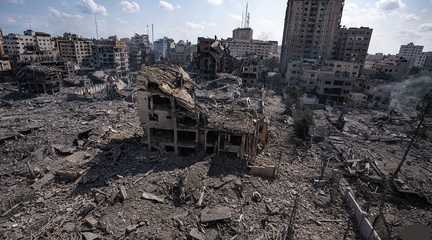
by Mohammad Krishan
Just as the Jews have never forgotten for a single day what happened to them in the Holocaust in Europe during the time of the Nazis – and this is their right and duty – we must never forget what their descendants did, and are still doing, to the Palestinians.
Their most powerful weapon was documenting everything, big and small, all the way to the famous Nuremberg Tribunal, which issued its rulings on 1 October, 1946, and in which US Attorney-General, Robert Jackson, was keen to rely in convicting the accused on irrefutable documents instead of eyewitness statements, so that the trial would not be accused of relying on forged or false testimonies.
As for our weapon today, it is to document what is currently happening in Gaza and, prior to that, in the five wars that Israel launched against the Gaza Strip (2008, 2012, 2014, 2021, 2022). In addition, its numerous violations since its establishment in 1948 and then, after 1967, in the West Bank and the Gaza Strip, are also conclusive documents, including video and audio footage, that the whole world has been watching in real time for over a month.
READ: UN chief says Gaza deaths show something ‘wrong’ with Israel operation
In January 2009, the Palestinian Independent Commission for Prosecution of the Zionist Occupation War Crimes Against Palestinians of the Zionist Occupation was established to monitor and document Israeli war crimes and follow up on filing lawsuits with international and national courts. It is the only official Palestinian body tasked with this, but that does not exempt other independent human rights bodies from carrying out the same task.
This body held several seminars in Palestinian universities and colleges, entitled “Enhancing community awareness about documenting the crimes of the Israeli occupation,” targeting students, especially students of law, media and medical professions, because their specialisations are related to the process of monitoring and documentation by focusing on how to deal with crime scenes, and the importance of documenting crimes to strengthen the principle of accountability and legal accountability of the Occupation leaders before the international judiciary.
The Palestinian Journalists Syndicate documents and monitors violations and crimes against journalists in this war. Given the difficulty of communication in Gaza and the inability to obtain confirmed information, the Union resorted to using a questionnaire to list the crimes committed since the beginning of the war, asking journalists to fill out this form “to convey the truth of what is happening with all credibility”.
When the Israeli Occupation cut off the Internet and communications from the Gaza Strip – which it did more than once – Amnesty International criticised the move, stressing that it had become difficult for human rights organisations to document violations and war crimes against civilians in Gaza, due to the Israeli Occupation deliberately cutting off communications during its violent bombing of Gaza.
The crimes currently being documented are many and all of them are serious violations of human rights and international humanitarian law, including the direct killing of women and children, who make up three-quarters of the victims, as well as the bombing of residential buildings, hospitals, ambulances and forced displacement. This is in addition to what is happening in the West Bank, including armed settler attacks, arbitrary arrests and unjustified restrictions on movement and ploughing streets with bulldozers for no apparent reason, in addition to the various aspects of apartheid policies.
Despite the well-known consensus in international law that the lands occupied by Israel in 1967 are occupied lands, and that settlement there is illegal and, despite Israel’s continued violation of the Hague Convention and the Fourth Geneva Convention, both of which state the illegality of settlements, the delegitimisation of the transfer of residents to the Occupied Territory and forcibly seizing private property there, Israel is still indifferent to this, benefiting from American and European support that places it above any accountability, always allowing it to act with impunity.
As long as there are certain crimes in international law that do not fall under the statute of limitations, unlike most civil legal systems in which the statute of limitations ranges between one and 30 years, depending on the severity of the crime, what is required now is diligent and tireless work to document everything that the Israeli Occupation has committed, not only in its current war on Gaza and its ongoing violations in the West Bank, but also in all its previous wars and in everything that the settlers protected by it have committed.
The Jews have clung to this principle in international law to prosecute any Nazi or others who managed to avoid accountability and may have disappeared under a false identity for decades in any part of the world. The Palestinians must follow their example. If, of course, the defeat of the Nazis opened the door to this, then American protection of Israel will not continue forever and the appropriate day will come for accountability, whether through existing international bodies, such as the International Criminal Court, or bodies created for this purpose. This makes what journalists are doing now a task of documentation, as well as activists on social media. This is why they are being targeted, with the number of journalists killed by Israel reaching 50, making it the highest number in any armed conflict in the world.
READ: 48 journalists killed since beginning of Israel war on Gaza
The Israeli Occupation’s killing of this number of journalists was not a coincidence, but rather systematic and intentional. However, killing witnesses will not destroy the evidence they left behind. There will come a day when the evidence collected will be relied upon to condemn this brutal Occupation.
This content was published in Middle East Monitor on November 08, 2023. To restrict the overall size; some images may have been excluded.
Opinions expressed in this article are the author's own and do not necessarily reflect the views of UMMnews.




